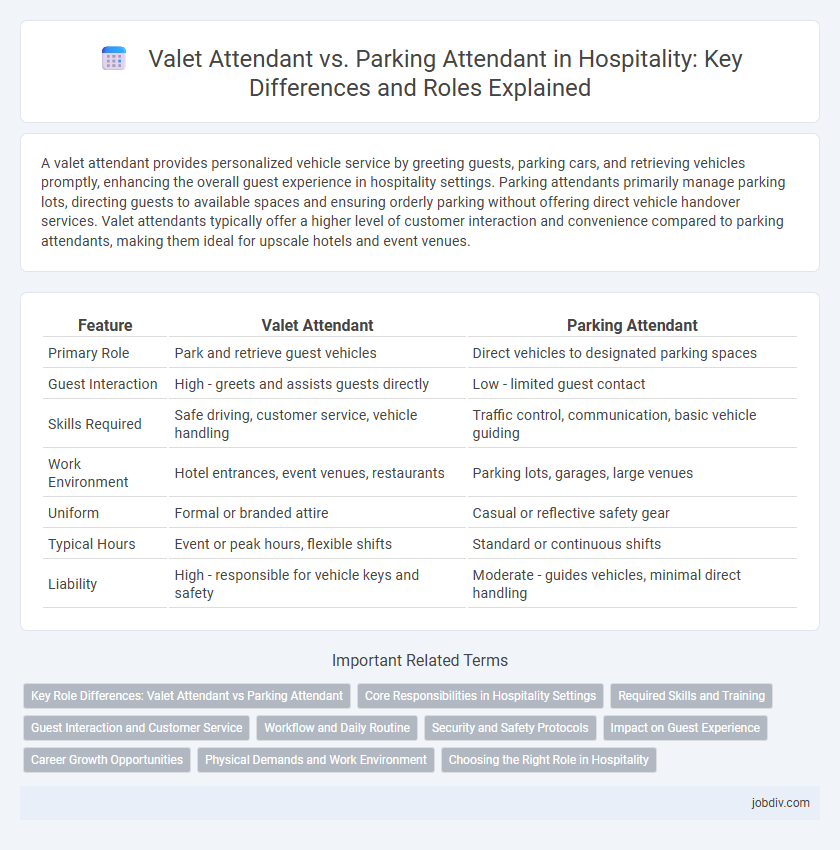A valet attendant provides personalized vehicle service by greeting guests, parking cars, and retrieving vehicles promptly, enhancing the overall guest experience in hospitality settings. Parking attendants primarily manage parking lots, directing guests to available spaces and ensuring orderly parking without offering direct vehicle handover services. Valet attendants typically offer a higher level of customer interaction and convenience compared to parking attendants, making them ideal for upscale hotels and event venues.
Table of Comparison
| Feature | Valet Attendant | Parking Attendant |
|---|---|---|
| Primary Role | Park and retrieve guest vehicles | Direct vehicles to designated parking spaces |
| Guest Interaction | High - greets and assists guests directly | Low - limited guest contact |
| Skills Required | Safe driving, customer service, vehicle handling | Traffic control, communication, basic vehicle guiding |
| Work Environment | Hotel entrances, event venues, restaurants | Parking lots, garages, large venues |
| Uniform | Formal or branded attire | Casual or reflective safety gear |
| Typical Hours | Event or peak hours, flexible shifts | Standard or continuous shifts |
| Liability | High - responsible for vehicle keys and safety | Moderate - guides vehicles, minimal direct handling |
Key Role Differences: Valet Attendant vs Parking Attendant
Valet attendants specialize in providing personalized car service by greeting guests, handling vehicle keys, and safely parking or retrieving cars to enhance customer experience at hospitality venues. Parking attendants primarily manage parking lot operations, directing cars to available spaces, monitoring traffic flow, and ensuring parking lot safety without direct guest interaction. The key difference lies in valet attendants' focus on customer service and vehicle handling, while parking attendants emphasize traffic management and lot organization.
Core Responsibilities in Hospitality Settings
Valet attendants in hospitality primarily manage guest vehicle parking by providing personalized service such as vehicle retrieval and handling, ensuring a seamless guest experience from arrival to departure. Parking attendants focus on organizing and supervising parking areas, guiding vehicles to available spots, and maintaining order within the parking facility. Both roles emphasize safety and efficiency but differ in the level of direct guest interaction and personalized service delivered.
Required Skills and Training
Valet attendants require strong customer service skills, excellent communication, and driving proficiency to safely park and retrieve vehicles, often necessitating specialized training in vehicle handling and guest interaction. Parking attendants focus more on organizational skills, traffic management, and basic maintenance knowledge, with training emphasizing operational efficiency and safety protocols. Both roles demand attention to detail, but valet attendants typically need advanced training to manage high-end vehicles and ensure superior guest experiences.
Guest Interaction and Customer Service
Valet attendants provide personalized guest interaction by greeting guests warmly, handling vehicles with care, and offering concierge-level service that enhances the overall hospitality experience. Parking attendants focus on efficiently organizing parking spaces and directing vehicles but usually have limited direct contact with guests, resulting in less customer interaction. Emphasizing valet attendants' role in creating a positive first impression, their hands-on customer service significantly elevates guest satisfaction compared to the more operational focus of parking attendants.
Workflow and Daily Routine
Valet attendants primarily manage guest vehicle retrieval and parking, ensuring swift, courteous service while maintaining seamless coordination with the front desk and concierge teams. Parking attendants focus on organizing and monitoring lot occupancy, directing vehicles to designated spaces, and overseeing the smooth flow of traffic within the parking area. Both roles require attention to safety protocols and effective communication, but valet attendants engage directly with guests, whereas parking attendants concentrate on operational efficiency behind the scenes.
Security and Safety Protocols
Valet attendants implement stringent security measures, including verifying vehicle ownership and maintaining supervised parking zones to prevent unauthorized access and theft, enhancing guest trust and safety. Parking attendants focus on safe vehicle guidance within lots, enforcing speed limits, and managing traffic flow to minimize accidents and property damage. Both roles require adherence to safety protocols such as emergency response training and the use of surveillance systems to ensure comprehensive protection of vehicles and guests.
Impact on Guest Experience
Valet attendants enhance guest experience by providing personalized, door-to-door service that reduces wait times and adds a sense of luxury. Parking attendants primarily manage vehicle organization in parking areas, which streamlines traffic flow but offers less direct interaction with guests. The presence of valet attendants often elevates perceived service quality and convenience, significantly impacting guest satisfaction in upscale hospitality settings.
Career Growth Opportunities
Valet attendants often experience faster career growth opportunities due to direct guest interaction and the development of customer service skills essential in upscale hospitality environments. Parking attendants typically have more limited advancement paths, focusing primarily on vehicle management and logistics without frequent guest engagement. Career progression for valet attendants may lead to supervisory roles or management positions within luxury hotels and event venues.
Physical Demands and Work Environment
Valet attendants endure high physical demands, including constant walking, standing, and handling vehicles in varied weather conditions, often requiring quick reflexes and strength to manage car doors and luggage. Parking attendants primarily work outdoors in parking lots, exposed to all weather elements, performing tasks such as directing vehicles and ticketing with moderate physical activity but less direct vehicle handling. Both roles require stamina and alertness, yet valet attendants face more intense physical strain due to close vehicle interaction and customer-facing responsibilities.
Choosing the Right Role in Hospitality
Valet attendants offer personalized guest service by parking vehicles directly, enhancing the luxury experience in high-end hotels and resorts, whereas parking attendants manage large parking facilities, focusing on organization and flow. Choosing the right role depends on the hospitality establishment's size, guest expectations, and service standards, with valet attendants often suited for premium venues seeking elevated customer interaction. Efficiency, security protocols, and guest satisfaction metrics are key factors to consider when selecting between valet and parking attendants in the hospitality industry.
Valet Attendant vs Parking Attendant Infographic

 jobdiv.com
jobdiv.com